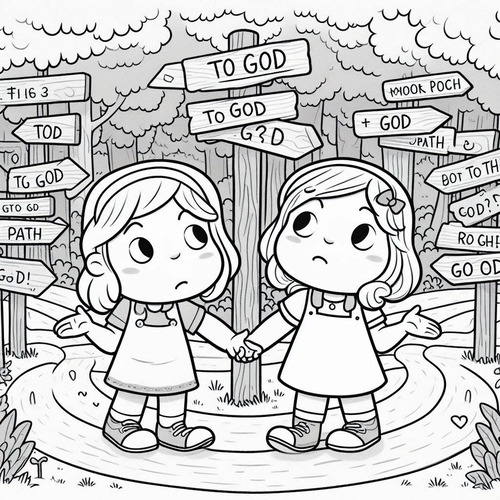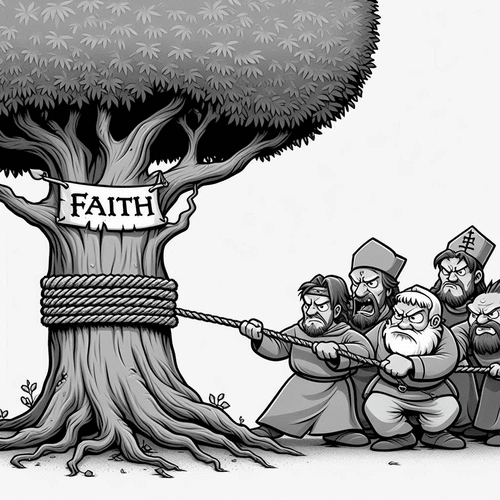The Unification Church: Departure from Christian Orthodoxy
Unification Church: Departure from Christianity The Unification Church, also known as the “Moonies” due to its founder Rev. Sun Myung Moon, is a new religious movement that emerged in the 20th century. Come, explore how the Unification Church’s teachings are a departure from orthodox, biblical Christianity.
Origins and Founder: The Unification Church was started in 1954 by Sun Myung Moon (1920-2012) in South Korea. Moon claimed to have received a vision and spiritual revelation to become the new Messiah and complete the mission that Jesus failed to accomplish. He synthesized elements of Christianity, Confucianism, Buddhism and other traditions into a unique theology he called the “Divine Principle.”
Core Teachings & Beliefs:
- View of God: The Unification Church rejects the doctrine of the Trinity, teaching instead that God has a masculine and feminine nature represented in Moon and his wife.
- View of Jesus: Jesus is not accepted as the unique Son of God but merely a prophet and forerunner to Moon, the “Lord of the Second Advent.”
- Fall of Man: They teach the Fall occurred through a sexual relationship between Eve and Lucifer which corrupted humanity’s blood lineage.
- Salvation & “Blessing”: Salvation is achieved by being “engrafted” into Moon’s sinless bloodline through an elaborate “Blessing” marriage ceremony he presided over.
- Life After Death: They reject the biblical teaching of heaven and hell, believing the soul is recycled through a series of reincarnations.
- Scripture: Moon’s core teachings in the Divine Principle take precedence over the Bible, which they view as a preparatory text.
Key Differences from Biblical Christianity:
- Denial of the Trinity and eternal deity of Jesus as the unique Son of God: The Moonies deny the doctrine of the Trinity and reject Jesus as the eternal, divine Son of God.
- Rejection of Jesus as the sole Lord and Saviour: Jesus is not accepted as the sole Lord and Saviour, and has been replaced instead by Rev. Moon as the “third Adam.”
- Denial of Jesus’ bodily resurrection: The Moonies denies the biblical account of Jesus’ bodily resurrection, teaching instead, only a spiritual resurrection.
- Salvation by grafting into Moon’s bloodline: Salvation is achieved not by grace through faith in Christ, but by being “engrafted” into Moon’s claimed sinless bloodline.
- Rejection of biblical heaven and hell for reincarnation: The Unification Church rejects the orthodox Christian doctrine of heaven and hell in favour of a series of reincarnations.
- Addition of extra-biblical texts superseding scripture: Moon’s Divine Principle and other revelations take precedence over the Bible as authoritative truth.
While attempting to incorporate some biblical concepts, the Unification Church’s theology represents a radical departure from the core doctrines of historical, orthodox Christianity derived from the Bible. Central truths like the nature of God, the person and work of Jesus Christ, and the means of salvation are redefined in ways that fundamentally conflict with the biblical gospel.
An honest evaluation reveals that despite borrowing some Christian terminology, the Unification Church espouses beliefs that are simply incompatible with foundational biblical doctrine. The teachings of Rev. Moon and the Divine Principle represent a new and unorthodox theology that falls outside the boundaries of Christianity as understood by the global church throughout history.
Unification Church Departure from Christianity: Related Reads
Editor's Pick

The Throne-Room Vision: Who Did Isaiah See?
The scene is unforgettable: Isaiah stands in the temple, and suddenly the veil between heaven and earth tears open. He [...]

The Angel of the Lord: Can We Be Certain It Was Christ All Along?
Throughout the Old Testament, a mysterious figure appears: the Angel of the LORD. He speaks as God, bears God’s name, [...]
SUPPORT US:
Feel the Holy Spirit's gentle nudge to partner with us?
Donate Online:
Account Name: TRUTHS TO DIE FOR FOUNDATION
Account Number: 10243565459
Bank IFSC: IDFB0043391
Bank Name: IDFC FIRST BANK






